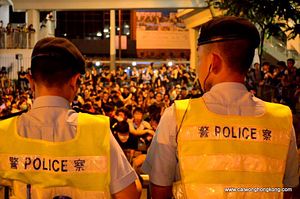North Korea has dominated this year’s Asia-Pacific news cycle. From “rocket man” to historic summits, from nuclear test site dismantlement to returns of troop remains, the region’s nuclear condition has pitched from catastrophic to cooperative. Such a precarious situation warrants close monitoring, and reasonably some anxiety.
However, a Korean Peninsula solution or a nuclear cataclysm are both distant futures. The situation is hemmed in by mutually assured destruction, protracted negotiation processes, and a recent successful North-South agreement to shut down one of the North’s main missile sites. If radars are to be trained on imminent crises, North Korea’s nuclear weapons are not it. Asia-Pacific watchers should really turn to Hong Kong.
Every five or 10 years since the 1997 handover, when the territory returned to mainland Chinese sovereignty as a special administrative region, analysts revisit the Basic Law — Hong Kong’s mini-constitution. It legally insulates British-born principles such as capitalism and the democratic project from mainland interference. Yet this insulation is not only porous; it may be temporary.
The Basic Law and 1984 Sino-British Joint Declaration both state that “the socialist system and policies shall not be practiced … and the previous capitalist system and way of life shall remain unchanged for 50 years.” Fifty years from the Handover would be 2047. It’s a nervous ball drop for locals. Pro-Beijing officials see the clause as a proclamation of the perpetuity of Hong Kong independence. The less placid worry it establishes a ticking time bomb – to what, exactly, is uncertain.
The current problem, however, is not that people are questioning the Basic Law’s interpretation. It is that people are questioning the Basic Law’s existence. At the Foreign Correspondents’ Club, when asked how one might embark on the arduous task of repealing Article 1 – which states that Hong Kong is an inalienable part of the People’s Republic of China – 28-year-old Hong Kong National Party convener Andy Chan Ho-tin dismissed the Basic Law altogether. He reasoned that Hong Kongers like himself played no part in its drafting or promulgation.
Chan’s Hong Kong National Party is Hong Kong’s first pro-independence political party. An emboldened democratic movement, often stumbling into pro-independence, can be traced to 2003, when hundreds of thousands protested a security bill that prohibited treason, secession, sedition, and subversion against Beijing. A decade later, 2014’s Umbrella Movement captivated the world as locals defended themselves from pepper spray under monsoon rains. Yet that electrifying crusade spawned an insidious and urgent sense of enmity toward the mainland. The countdown to 2047 is dangerous not because China will seek Hong Kong’s deference, but because Hong Kong may seek its independence. Beijing will surely retaliate.
Medical professionals agree: prevention is preferable to prescription. But peace literature explains why conflict prevention is poorly funded, studied, and understood. It comes down to more actionable crisis management initiatives capturing political attention in combination with the many difficulties of preventing something that doesn’t yet exist. What constitutes a warning? How do you separate signal from noise? What if you have a full plate? What if you’re wrong?
Although mitigating a 2047 Hong Kong crisis faces these same issues, warning signs already abound. The 2014 Umbrella Movement signaled social grievances and schisms. Subsequent localist groups easily recruited young Hong Kongers, who increasingly identify as Hong Konger and not Chinese. In 2016, two members from independence-leaning party Youngspiration almost secured Legislative Council seats. Chan’s Hong Kong National Party was convened this April. And just this month, a summer of controversy culminated in Hong Kong giving mainland immigration authorities legal jurisdiction in the West Kowloon Terminus – contravening a cardinal Basic Law principle that mainland laws shall not be applied in Hong Kong.
These ripples of independence signal conflict to come, yet they are being dismissed. South China Morning Post contributors brush pro-independence forces aside as illogical, illegal, and radical. Allegations that Demosistō party members were unnecessarily detained on the mainland were quickly shot down by Chief Executive Carrie Lam herself.
Even worse, signals are being suppressed. Lam publicly called for Hong Kong universities to tamp down secessionist dialogue. The Legislative Council de facto barred pro-independence politicians from running. Hong Kong courts jailed Demosistō and Youngspiration members for their disturbances. Chan’s Hong Kong National Party has been temporarily banned.
Dismissal is of little consequence, but suppression fuels radicalization. A veiled poll conducted by the Hong Kong University of Science and Technology found that close to 40 percent of polled students supported the violent pursuit of Hong Kong’s political rights. In 30 years’ time, it may be these mavericks who decide Hong Kong and China’s fates.
Why does a Hong Kong-mainland confrontation matter? First, trade. The Port of Hong Kong consistently ranks in the global Top 10 by shipping volume, as do the ports of its mainland counterparts across the Bay. Clashes would disrupt this massive hub for international trade and finance. Second, spillover. A violent bid for independence may spill over to other regions were Chinese sovereignty is resented, such as Tibet and Xinjiang, and of course self-governing Taiwan, which the mainland claims. Third, diaspora. Once news travels to international Hong Kong communities – the largest of which total half a million each in mainland China and Canada – the world should expect civil unrest. A Hong Kong-mainland problem is a global problem.
Today, Hong Kong’s pro-independence tides are being too easily dismissed and suppressed, crowded out by flashier but ultimately non-urgent spectacles. To prevent yet another violent conflict, antidotes to escalation must be prepared in advance. It starts with looking to and empathizing with Hong Kong’s youth: 2047’s decision-makers.
Rachel Xian is a policy research analyst at the Johns Hopkins School of Advanced International Studies. She specializes in East Asian conflict management, with research interests in conflict psychology and Chinese technology.

































